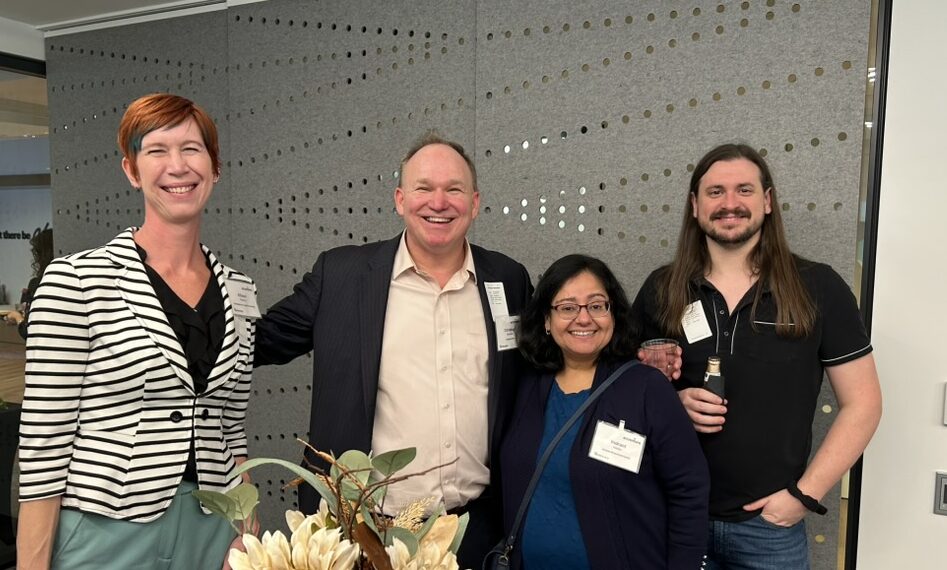The importance of being in the right place at the right time cannot be overstated.
That’s especially true in Pittsburgh where local partnerships can ignite innovation and drive growth that ranges widely across the city’s 90 unique neighborhoods.
Some of Technical.ly’s 2024 RealLIST Connectors gathered Wednesday at Accenture’s new downtown office for an in-person happy hour. The event provided a unique opportunity for local tech leaders to exchange ideas and explore potential partnerships. Over drinks and appetizers, with a view of the city in the background, attendees discussed how location has shaped their connections and the local tech ecosystem.
“A thriving startup community in Pittsburgh exists among many neighborhoods and should remain that way,” Jenny Sharpe, director of workforce development for the nonprofit Pittsburgh Robotics Network (PRN), told Technical.ly. “There’s something for everyone in Pittsburgh.”
PRN touts Pittsburgh as the robotics capital of the world, with its epicenter located along Robotics Row, a two-mile stretch along the Allegheny River from Lawrenceville to downtown.
While the energy and nearby robotics firms in the area contribute to PRN’s current work, Sharpe said, her previous experiences in other Pittsburgh neighborhoods have highlighted numerous opportunities to connect with like-minded innovators.
“During my time working in East Liberty, it was very common to run into founders at lunch or at a local coffee shop,” Sharpe said, “It really felt like a community.”
Neighborhoods near Pitt, CMU and UPMC stand out for collaboration
Unlike many cities where the downtown area may serve as the primary tech and business hub, Pittsburgh’s tech ecosystem is spread across multiple unique locations throughout the city.
For example, public-private partnership InnovatePGH’s Oakland location happened in response to where innovation naturally originates in the city, according to community and research manager Charles Mansfield.
“One of the core theses of InnovatePGH is that Oakland is the engine of the ecosystem,” Mansfield said. “Most of our startups at the earliest points have some form of origin in the neighborhood or with the universities.”
Oakland, otherwise known as Pittsburgh’s Innovation District, is considered the city’s center of academics and research. Near the campuses of Carnegie Mellon University, the University of Pittsburgh and UPMC, the district is some of the most valuable real estate in the region.
Certain areas of the city, like Oakland, have their own “specialties,” Mansfield said, but everything is close enough that innovators have access to different resources and networks if they put in the effort to look.
Downtown revitalization may not be enough to shake tech industry preferences
While local leaders work to revitalize downtown to attract a variety of businesses, connectors say the area may still struggle to attract Pittsburgh’s tech scene.
The City of Pittsburgh, Allegheny County and the Allegheny Conference on Community Development released a collaborative Downtown Revitalization Vision Plan earlier this year.
It envisions transformations of three high-impact areas of the city’s center, including Market Square and Point State Park. The plan has a two-year time frame, according to the Allegheny Conference CEO Stefani Pashman.
One of the top strategic redevelopment goals for the project is for downtown to become an economically competitive business environment that attracts, retains and encourages a diverse range of businesses. Despite downtown being the second largest employment center in the state and the employment location of 74,000 workers, downtown employees have declined by 17% since 2002 due to business closures or relocations, according to the revitalization plan.
According to the revitalization plan, the region’s growing tech sectors, including AI, advanced manufacturing and energy, are not seeking traditional upper-floor commercial office space.
Different industries tend to gravitate towards certain neighborhoods, as opposed to downtown, for a multitude of reasons, according to Andrew Millberg, senior vice president of real estate brokerage firm JLL.
“While the vast majority of tenants in downtown are financial institutions and other professional services firms, tech companies typically focus their space searches in neighborhoods like the Strip District and East Liberty,” Millberg said.
From Millberg’s observations, tech companies appreciate affordable parking, proximity to other tech companies and university talent, as well as easy access to preferred amenities in those areas. Startups may not prefer downtown because of their younger employees who prioritize third spaces, or places outside of work or home where people can interact and build community.
However, as a 14-year resident and champion of Pittsburgh’s downtown, Millberg said he would love to see the area become a go-to place for tech and startup companies, but it won’t happen overnight.
“There’s data out there to suggest that neighborhoods with greater concentration of coffee shops and other third places have higher rates of innovation, entrepreneurship and startup creation,” Millberg said. “And no offense to the Starbucks and Jimmy Johns of the world, but when I say coffee shops and other attractive third places, think places like the Produce Terminal, KLVN Coffee Lab and Margaux.”







